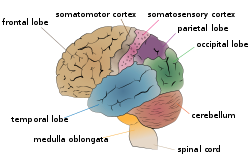In a scientific first, Columbia neuroengineers have created a system that translates thought into intelligible, recognizable speech. By monitoring someone’s brain activity, the technology can reconstruct the words a person hears with unprecedented clarity. This breakthrough, which harnesses the power of speech synthesizers and artificial intelligence, could lead to new ways for computers to communicate directly with the brain. It also lays the groundwork for helping people who cannot speak, such as those living with as amyotrophic lateral sclerosis (ALS) or recovering from stroke, regain their ability to communicate with…
Read MoreCategory: Brain
Chronic inflammation in middle age may lead to thinking and memory problems later
People who have chronic inflammation in middle-age may develop problems with thinking and memory in the decades leading up to old age, according to a new study published in the February 13, 2019, online issue of Neurology®, the medical journal of the American Academy of Neurology. There are two kinds of inflammation. Acute inflammation happens when the body’s immune response jumps into action to fight off infection or an injury. It is localized, short-term and part of a healthy immune system. Chronic inflammation is not considered healthy. It is a low-grade…
Read MoreBrain’s primitive sensory region also participates in sophisticated learning
Columbia neuroscientists have revealed that a simple brain region, known for processing basic sensory information, can also guide complex feats of mental activity. The new study involving mice demonstrated that cells in the somatosensory cortex, the brain area responsible for touch, also play a key role in reward learning, the sophisticated type of learning that allows the brain to associate an action with a pleasurable outcome. It is the basis for how we connect our work in the office to that paycheck, or that A+ to the studying we did…
Read MoreChildren with autism, co-occurring ADHD symptoms lag in key measures of independence
A pair of new studies has provided new insight into the challenges faced by children on the autism spectrum who exhibit symptoms of attention deficit/hyperactivity disorder (ADHD). According to the findings from researchers at Children’s Hospital of Philadelphia (CHOP), these children have difficulty with adaptive behavior, a key measure of independence. Additionally, researchers pinpointed weaker functional connections in two large brain networks in children on the autism spectrum who have co-occurring ADHD symptoms. The first study, published in the Journal of the American Academy of Child and Adolescent Psychiatry, analyzed adaptive…
Read MoreBrain connections that disadvantage night owls revealed
‘Night owls’ — those who go to bed and get up later — have fundamental differences in their brain function compared to ‘morning larks’ , which mean they could be disadvantaged by the constraints of a normal working day. Research led by the University of Birmingham found that individuals whose internal body clock dictates that they go to bed and wake up very late (with an average bedtime of 2:30am and wake-up time of 10:15am) have lower resting brain connectivity in many of the brain regions that are linked to…
Read More




